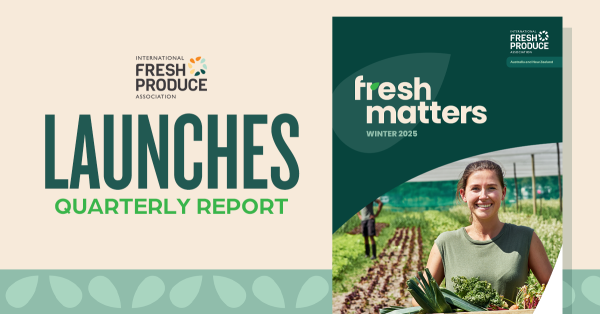
California Fresh Fruit Association's Ian LeMay Discusses California Labor Updates
CALIFORNIA - The importance of a strong labor force in an industry like agriculture is not to be understated, primarily due to the time sensitivity and impact of the products from harvest to distribution to consumers. This is even more true in states like California, where the success of fresh produce is critical to a thriving economy.
Over the years, to support both the workforce and companies that employ them, industry advocates have introduced bills ranging from mechanization to immigration. Ian LeMay, President of the California Fresh Fruit Association (CFFA), was gracious enough to sit down and discuss recent updates and the pressing need for reform.
 “The current state of labor reform remains as it has for about 37 years since the last time our federal government took any meaningful action related to our immigrant workforce. That was back in 1986 with the Immigration Reform and Control Act,” Ian begins. “Now, where we find ourselves as advocates in the labor space is in round three of the introduction of the Farm Workforce Modernization Act, which is legislation specifically focused on the agriculture workforce already here in the United States. That bill has passed out of the House of Representatives twice on relatively bipartisan votes but, unfortunately, was not taken up by the Senate either time.”
“The current state of labor reform remains as it has for about 37 years since the last time our federal government took any meaningful action related to our immigrant workforce. That was back in 1986 with the Immigration Reform and Control Act,” Ian begins. “Now, where we find ourselves as advocates in the labor space is in round three of the introduction of the Farm Workforce Modernization Act, which is legislation specifically focused on the agriculture workforce already here in the United States. That bill has passed out of the House of Representatives twice on relatively bipartisan votes but, unfortunately, was not taken up by the Senate either time.”
As Ian explains, there has been a growing emphasis on the application of the H-2A visa system, but even with its increased use, the program has limitations for California growers. In the eyes of many industry advocates, the costs and growing demand for its utilization need updating, leaving challenges with the program consistent.
“The problem with this system is that it leaves many good people who live and work in our communities without the type of confidence or comfort they deserve,” Ian adds. “And it also puts the reliability of our domestic food supply in jeopardy if producers do not have a resident workforce for the industry.”

This is especially challenging in California, which is not only a top agricultural producing state but also has the most diversity in crops. Of the more than 400 different commodities produced in California, many fall under the specialty crop category, and they still rely on human hands to pick, pack, and ship to make their way to consumers.
One solution that has gained increased focus is technology, Ian states.
“We’re seeing some advancements in mechanization and automation, but nowhere near the application or adoption to mitigate our need for a present workforce,” he says. “Those pressures are far more apparent because of the need and the demand of our agriculture sector versus other areas of the United States that can rely on combines or larger pieces of equipment.”
Last week, congressmen David Valadao (R – CA 22) and Jim Costa (D – CA 21) introduced the Specialty Crop Mechanization Assistance Act of 2023, which will help ensure American farmers can invest in agricultural innovations that lead to increased efficiency and economic viability.

This legislation proposes a cost-share grant program for specialty crop producers interested in modernizing their operations but facing financial limitations. The program would provide significant financial support, offsetting the costs of acquiring new equipment and providing the necessary technical assistance and worker training. This, in turn, will create more skilled positions in farming operations, providing upward mobility for employees.
With ongoing advocacy and legislative measures, what can California growers do to prepare for potential policy changes?
“In terms of labor policy and regulation, California continues to be at the forefront of labor regulation, whether that be wages or different operational standards. Our growers have had to adapt to these policies,” Ian states. “They’ve often made it more challenging to operate our businesses, especially when dealing with perishable commodities. But we continue to meet that bar that our state regulators set for us.”

While the process of reform remains ongoing, Ian tells me that despite what has been said, in the commodity sector that CFFA works within, the workforce is not lacking.
“Labor is always tight. I think that’s based on the competitiveness of the fresh fruit industry. So that’s where employers continue to strive to improve the work environment and attractiveness of the work we do,” he imparts. “But as of right now, labor is tight, but I wouldn’t call it short.”
For the latest updates on industry advocacy and legislation, keep reading AndNowUKnow.





















